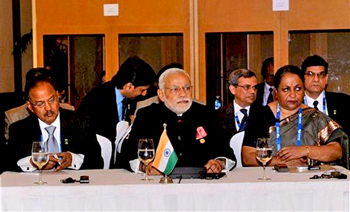
Raising the pitch on the black money issue, Modi in his intervention at the summit of the Group of 20 industrialised and major emerging economies called for close global coordination to address the challenge posed by it.
Modi voiced India's support for a new global standard on automatic exchange of tax information, saying it would be instrumental in getting information relating to unaccounted money hoarded abroad and enable its eventual repatriation.
He also extended India's backing for all initiatives to facilitate exchange of information and mutual assistance in tax policy and administration.
The prime minister made the remarks at the plenary session on the subject of "Delivering Global Economic resilience" on the second and final day of the summit held at the Brisbane Exhibition and Convention centre.
He also expressed the hope that Base Erosion and Profit Sharing (BEPS) system would fully address concerns of developing and developed economies.
BEPS is a technical term referring to the effect of tax avoidance strategies used by multinational companies on countries' tax basis. BEPS is known more commonly as "Transfer pricing"
This term is used in a project headed by the OECD that is said to be an attempt by the world’s major economies to try to rewrite the rules on corporate taxation to address the widespread perception that the corporations don’t pay their fair share of taxes.
The prime miniser also said that increased mobility of capital and technology have created new opportunities for avoiding tax and profit shifting.
Modi underpinned the need for the world community to take coordinated decisions although each country has its domestic priority.
"Need for policy coordination among major economies remains strong," he said.
"Close coordination is imporant not just for addressing the challenge of black money but also security issues like terrorism, drug trafficking and arms smuggling," he said.
Touching upon the resilience of the financial system in the world, Modi said it will also depend on cyber security.








Comments
Add new comment